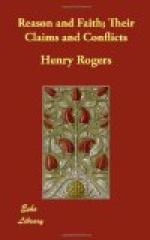impossibility of miracles in general; and that not
merely because if theists at all, they will see the
absurdity of the assertion, while they admit that
the present order of things had a beginning; and, if
Christians at all, the equal absurdity of the assertion,
while they admit that it will have an end;—not
only because the geologist will have familiarised
the world with the idea of successive interventions,
and, in fact, distinct creative acts, having all the
nature of miracles;—not only, we say, for
these special reasons, but for a more general one.
The true philosopher will see that, with his limited
experience and that of all his contemporaries, he has
no right to dogmatise about all that may have been
permitted or will be permitted in the Divine administration
of the universe; he will see that those who with one
voice denied, about half a century ago, the existence
of aerolites, and summarily dismissed all the alleged
facts as a silly fable, because it contradicted their
experience,—that those who refused to admit
the Copernican theory because, as they said, it manifestly
contradicted their experience,—that the
schoolboy who refuses to admit the first law of motion
because, as he says, it gives the lie to all his experience,—that
the Oriental prince (whose scepticism Hume vainly
attempts, on his principle, to meet) who denied the
possibility of ice because it contradicted his experience,—and,
in the same manner, that the men who, with Dr. Strauss,
lay down the dictum that a miracle is impossible and
a contradiction because it contradicts their experience,—have
all been alike contravening the first principles of
the modest philosophy of Bacon, and have fallen into
one of the most ordinary illusions against which he
has warned us namely, that that cannot be true which
seems in contradiction to our own experience.
We confidently predict that the day will come when
the favourite argument of many so called philosopher
in this matter will be felt to be the philosophy of
the vulgar only; and that though many may, even then,
deny that the testimony which supports the Scripture
miracles is equal to the task, they will all alike
abandon the axiom which supersedes the necessity of
at all examining such evidence, by asserting that no
evidence can establish them.
While on this subject, we may notice a certain fantastical
tone of depreciation of miracles as an evidence of
Christianity, which is occasionally adopted even by
some who do not deny the possibility or probability,
or even the fact, of their occurrence. They affirm
them to be of little moment, and represent them—with
an exquisite affectation of metaphysical propriety—as
totally incapable of convincing men of any moral truth;
upon the ground that there is no natural relation between
any displays of physical power and any such truth.
Now without denying that the nature of the doctrine
is a criterion, and must be taken into account in
judging of the reality of any alleged miracle, we have




